Hair loss is a big problem, especially for the fair sex. After all, a luxurious hairstyle is the hallmark of a well-groomed woman. At first, a change of funds comes to mind, the selection of a special serum for nourishing the hair follicles. And what if this does not help? What tests to pass with hair loss? Of course, a consultation with a trichologist cannot be avoided, but nevertheless it does not hurt to better understand this issue.
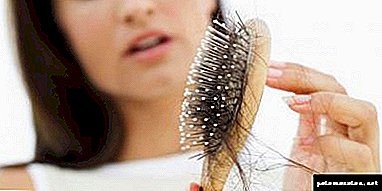
Methods for diagnosing baldness
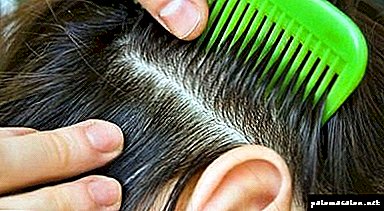 Diagnosis of alopecia includes the following research methods:
Diagnosis of alopecia includes the following research methods:
- examination of the scalp,
- Trichogram - microscopic examination of removed hair,
- histological examination of the scalp,
- general blood analysis,
- serological reactions for lupus erythematosus or syphilis,
- blood chemistry,
- a blood test for thyroid hormones.
- microscopic analysis of pathogenic fungi.
Of considerable diagnostic importance is a survey of a woman with the problem of baldness..
Answers should be received to such questions as the duration of the problem, the presence or absence of unpleasant sensations on the scalp (itching, burning), possible stresses and severe shocks in the last six months.
Factors such as hormonal contraceptive use or abortion may also affect hair loss..
According to statistics, sudden hair loss in women in 95% of cases is temporary and occurs due to psycho-vegetative disorders - this is a strong emotional turmoil and stress. And only 5% are diagnosed with irreversible alopecia - focal or androgenetic.
What tests does trichologist prescribe for hair loss? This will be discussed in the next paragraph of our article.
Blood (total)
 General clinical blood test conducted to determine the level of hemoglobin in the blood and exclude iron deficiency anemia - one of the causes of alopecia.
General clinical blood test conducted to determine the level of hemoglobin in the blood and exclude iron deficiency anemia - one of the causes of alopecia.
Normally, the level of hemoglobin in the blood of a woman is determined in the ranges of 115 - 145 g / l.
If the hemoglobin concentration in the blood is below 100 g / l, then iron deficiency anemia can be considered the cause of hair loss..
Blood chemistry
In the biochemical analysis of blood draw attention to the following components (normal values are shown in parentheses):
- ALT (7-40 IU / L),
- AST (10 - 30 IU / l),
- total protein (65 - 85 g / l),
- bilirubin (less than 3.4–17.1 μmol / l),
- cholesterol (3.11 - 5.44 mmol / l),
- sugar (3.9 - 6.4 mmol / l),
- alkaline phosphatase (39 - 92 IU / l).
Hormonal examination
 Increased hair loss may be a symptom of hypothyroidism, a disease of the thyroid gland caused by thyroid hormone deficiency. (For other hormonal disorders and their impact on hair loss, read here.)
Increased hair loss may be a symptom of hypothyroidism, a disease of the thyroid gland caused by thyroid hormone deficiency. (For other hormonal disorders and their impact on hair loss, read here.)
To diagnose the disease prescribe a blood test to determine the concentration of TSH and T4.
Normally, TSH is determined in the range from 0.24 to 4.0 mMe / L, and T4 - from 65 to 160 nmol / l.
If the hormone TSH is above 4.0 mMe / L and T4 is reduced, then the diagnosis of hypothyroidism is beyond doubt.
There may be situations when TSH is determined within the normal range, and T4 is lowered - in this case, it is a question of initial or latent hypothyroidism.
Analysis of the content of sex hormones in the blood allows you to set (exclude) androgenetic alopecia.
Normal values in the follicular phase of the cycle:
- LH (1 - 20 U / l).
- FSH (4 - 10 U / l).
- Estradiol (5 - 53 pg / ml).
- Progesterone (0.3 - 0.7 µg / l).
- Testosterone (0.1 - 1.1 µg / l).
- SSG (18.6 - 117 nmol / l).
Results are evaluated in the complex. With increased testosterone and reduced CVD, androgenetic alopecia is confirmed.
On pathogenic mushrooms
 Alopecia of the front of the head can be the result of a fungus injury.
Alopecia of the front of the head can be the result of a fungus injury.
The most frequent fungal diseases of the scalp - trichophytosis or microsporia, popularly known as ringworm.
The hair breaks off, or falls out together with the bulb in certain parts of the head, forming bald spots.
Under laboratory conditions, the fungus is examined for scraping the scalp and hair.
Normally, pathogenic fungi are not detected..
Trichogram
Microscopic examination of remote hair, along with examination of the scalp is the main diagnostic method in trichology. By the nature of baldness, you can determine the form of alopecia, whether this phenomenon is temporary or irreversible.
- 50 hairs are removed from the head with tweezers and their bulbs are examined under a microscope to determine their life cycle.. Normally, up to 90% of all hairs are in the active anagen phase. If more than 15% of the hairs removed are in the telogen stage, then it can be assumed that there is androgenetic or telogen alopecia. They can be differentiated through research on sex hormones.
- If there are pockets of baldness on the head, under the microscope, examine the hairs around the focus and the condition of the skin in this area.. It is important to distinguish focal from cicatricial alopecia. In the first case, the disease has an autoimmune nature, in the second it is a consequence of fungal, infectious diseases or head injuries. In focal baldness, the hairs on the edges of the bald spots are broken off and thickened at the tip.
Briefly about the main thing
The health of the skin and hair directly depends on the state of the body as a whole. In most cases, the causes of intense hair loss lie in the depths of the body. Most often, this is caused by hormonal imbalances, dysfunctions and inflammatory processes, intestinal dysbiosis and impaired immune system.
That is, even the most experienced doctor cannot immediately determine the cause. But he will tell you what tests to pass with hair loss, in order to outline the correct course of treatment. Today, anyone can take an examination in a paid laboratory. But do not think that after him you will assign yourself a treatment. The trichologist must necessarily interpret the results. This is a specialist in hair and scalp problems.
Do not waste money
Once again, let's return to the fact that first of all a person tries to solve his problems on his own. Today, advertising actively promotes various costly funds that are capable of miracles. These are shampoos, balms, sprays. But to check any of them can not stop hair loss. Moreover, most of them contain harmful parabens, silicones and sulfates. This is not about professional cosmetics, but about what lies on the shelves of supermarkets. If possible, it is better to consult a hairdresser and purchase funds from the professional series.
Therefore, you should not change shampoos one by one, hoping that the next one will make your hair look like the one shown in advertising. It is better to focus on the examination and find out what tests to pass with hair loss.

Important rule
Today it is not a secret that the quality of service in public and private clinics can vary greatly. Therefore, if time and money allows, it is better to undergo a comprehensive diagnosis in a trustworthy clinic. This is especially important for those who have not been examined for a long time and did not pass at least general tests.
At the same time, women can also register for a consultation with a gynecologist and endocrinologist. It is imperative that everyone needs to undergo an ultrasound of the thyroid gland and make a general clinical blood test. This is only a basic examination. Additionally, each can give their own directions.

Survey for self-examination
Examination for hair loss begins with a consultation with a doctor, where he will definitely collect anamnesis. Therefore, it is best to analyze your lifestyle, prepare answers at home and not waste time in the office. Questions will be the following:
- Do you get enough sleep? How often do you have to go to bed after midnight, and what causes it?
- Do you have enough rest? A person needs a lunch break, preferably with a walk on the street. After the 8-hour workday, switch to other activities. An excellent option would be sports or walking, watching your favorite shows, chatting with loved ones.
- Rate your diet. Is it somewhat balanced? For this, it is not bad to fill out a food diary within 10 days.
- What medications do you take?
- Do you lead a healthy lifestyle?
- What conditions do you work in?
- What care products do you use daily?
The list of tests for hair loss will depend on what you tell the doctor and what conclusions he will draw from this.

Simple test
Always very sorry for the time and money to go to the doctors. Therefore, we usually pull to the last, convincing ourselves that nothing terrible is actually happening. Therefore, make a simple experiment on your hair. Take a small strand, squeeze it between your thumb and forefinger and slowly pull. Now evaluate the result. If the number of fallen hairs is more than seven, then it is imperative to go to a trichologist consultation.
The rate of hair loss in women is up to 125 per day. The maximum amount will fall out when washing. Between water procedures, the loss is about 50 pieces per day. If you see that in your case much more is lost, then you need to take action. In addition to the survey, the doctor examines the scalp with the help of a special camera and makes a conclusion about the density of hair growth per square centimeter.

Causes of hair loss
This may include serious thinning of the hair. Of course, during the life of the hair fall out, and this is absolutely normal. The reasons for this may be the following:
- Infectious and fungal diseases. And you need to understand what is meant not only skin lesions, but also internal organs. Fungal infection can be detected by biopsy of the scalp.
- Violation of hormonal background. Here, too, everything is quite predictable. Estrogen deficiency or excess testosterone causes hair follicles to be hungry. They lose strength, burn out. Hormonal disorders do not occur from scratch. The most common causes are diseases of the thyroid gland, ovaries or adrenal glands. Frequent stress, prolonged medication, pregnancy - all this can cause deterioration of the endocrine system.
- Avitaminosis. Another common reason for which it is customary to write off all the problems with well-being. But in this case, the lack of important substances can really play a significant role. Hair bulbs need to be supplied with micro and macro elements. With an unbalanced diet, they lack the necessary substances, begin to weaken, and the hair falls out.
Of course, the doctor has a difficult task - to deal with the variety of reasons and find the one that will lead to the solution of the problem. That is why it is very important that the specialist is competent and well know what tests are prescribed for hair loss. Otherwise, treatment will be a waste of time and money.
Laboratory tests
- Very often trichologists recommend their patients to undergo biochemical blood tests. It allows the specialist to assess whether the kidneys and the liver are working properly, whether there is an active inflammatory process. In addition, this analysis allows to evaluate the balance of micronutrients.
- But more often it is just the beginning. Biochemistry can be done even before the visit to the doctor, so that the first reception was more informative. After listening to the patient, the doctor will determine which tests to pass. When hair loss has to take into account many factors. For example, you can not ignore the hormones. To diagnose a disease of the scalp and hair, an analysis is needed for T3, T4, TSH, prolactin, FSH, LH, free testosterone, and progesterone. In some cases, the list may be reduced or increased.
- It is advisable to pass the test for serum iron. This will eliminate anemia.
- The number of examinations includes specific tests that are necessary for accurate diagnosis. This is a spectral analysis of hair and mineralogram. The mineral imbalance in this case will allow to unravel the tangle further and look for the cause of the latter. Spectral analysis shows the ratio of the trace elements in the composition of the curls themselves.

Additional screening for parasites
Another reason that a trichologist must necessarily consider. Treatment for hair loss can be long and unsuccessful, and all because the probability of infection with helminths is missed. After all, the simplest very often remains outside our attention.
Hair loss and the presence of worms in the intestine are closely related. Therefore, the analysis of feces on the eggs of the worm is necessary to do. This will allow time to adjust the treatment. At the same time, blood donation is prescribed to check for parasitic infections. For this reason, the problem often begins, especially in children.
Prevention
This is especially true if we are talking about teenagers. Tests for hair loss in them are most often within the normal range, so doctors refer to age-related changes and hormonal failure. But it is also important to convey to the young girl or young man certain rules that will help to forget about this problem:
- The state of curls depends on the food consumed. Therefore, forget about soda, chips and hamburgers. Better a full meal in the school cafeteria. And various flavors and flavorings do not add any health to the hair.
- It is important to include in the diet a sufficient amount of vitamins and minerals.
- Regardless of fashion, you need to take care of your hair. That is, wear a winter hat, and in the summer - a light cap.
Proper care
This applies not only to teenagers. Life today is accelerating everything; therefore, there is less time for hair care. That is why we comb it on the run, and we switch on the full power when laying. And then we ask the doctors what to do. Analyzes are normal - hair loss can be stopped by home remedies:
- Wash your hair only in the direction of hair growth.
- Wipe them with a soft towel and dry naturally.
- Limit the use of hair dryers, curling iron and ironing.
Stressful situations adversely affect the state of the locks. Therefore, in the evening it is not bad to brew tea with chamomile, mint and melissa.

Drug treatment
The doctor should select it, each patient individually. But today there is a drug on the market that is sold without a prescription and collects good reviews. Pantovigar for hair loss is an effective tool to combat this delicate problem. In the composition of the drug:
- Vitamin B1.
- Para-aminobenzoic acid.
- Medical yeast.
- Keratin.
- Cystine.
- Calcium D-pantothenate, or vitamin B5.
That is, in the first place, the drug provides the hair with necessary substances. This allows you to enhance their growth, as well as make them softer, silky and healthy. This is confirmed by numerous reviews."Pantovigar" from hair loss can be included in the complex therapy, when a problem other than beriberi and malnutrition of the hair follicles is found. Copes with its task complex perfectly. Of course, the drug is quite expensive, for which he often stars in the rating.
Why does hair fall out?
There are several groups of factors affecting the condition of the hair, the most common of which are:
- endocrine system malfunction
- head injuries
- neurological disorders
- treatment with certain drugs
- hormonal disbalance,
- inflammation in the body
- dysbacteriosis,
- fungal and bacterial infections,
- chemotherapy, radiation exposure,
- stress, depression,
- malnutrition, avitaminosis,
- damage to the skin in the head area.
Often, hair falls out due to stress, after a serious illness and at the time of hormonal adjustment of the body, and baldness is temporary. However, if the “hair fall” does not stop for several weeks, it is imperative to be examined by the trichologist and pass tests to identify the causes of baldness.
To diagnose this serious problem, you can conduct a simple test yourself. Pinch a thin strand of curls between your index finger and thumb and pull it with a little pressure. If there are more than 6 hairs left in your hand, consider visiting a specialist.
Before sending a patient to take tests to identify the cause of baldness, the specialist will conduct a detailed survey of the patient, ask how long the problems started, what is the frequency of hair loss, whether the ancestors suffered from alopecia. The trichologist also finds out whether the patient is overworked at work, if he eats properly, sleeps well, and what serious diseases he has suffered in his entire life.
After the survey, the doctor will examine the scalp and then make a trichogram. This study, conducted with the help of a micro video camera, will visually show the specialist the condition of the scalp and will allow you to assess how thickly your hair grows.

What tests need to pass when baldness?
For hair loss, it is best to undergo an extensive examination at a medical center you trust and get advice from an experienced specialist. Some trichologists also recommend that all organs be diagnosed in order to get the most detailed picture of the patient's state of health.
When baldness in women, the trichologist first sends patients for tests to a gynecologist and an endocrinologist. The men are immediately referred to a gastroenterologist, a neurologist. Patients are recommended to do an ultrasound of the thyroid gland and pass a general or biochemical blood test.
A detailed blood test for baldness shows the trichologist whether the liver, kidneys and other internal organs and systems work normally. The test also demonstrates the balance of trace elements and indicates the presence or absence of inflammation in the body.
Another important analysis that needs to be done with baldness is blood donation for thyroid hormones.
This study for baldness (for women) usually includes testing the following elements:
- TSH assay for thyroid stimulating hormone levels.
- T3 and T4 - analysis of thyroid hormones.
- FSH is a study of follicle-stimulating hormone.
- LH - the level of luteinizing hormone.
- Progesterone.
- Prolactin.
- Free testosterone
- DGEA-S is a steroid androgenic hormone produced by the adrenal glands.
Alopecia in diseases of the thyroid gland is accompanied by many other unpleasant symptoms: curls become dry, brittle, begin to fall out. The hair on the eyebrows, eyelashes significantly decreases, there is a rapid heartbeat, frequent stress and depression, rapid loss or weight gain, deterioration of the nails.
If the tests reveal the cause of baldness in hormonal abnormalities, the trichologist will work with the endocrinologist to treat the patient.
The doctor also directs patients to clarify the level of serum iron. This analysis of baldness tells about the likelihood of anemia, which is also often the cause of hair loss.
The most common specific analyzes for baldness are mineralogram and spectral monitoring. The trichologist assigns such studies to determine the condition of the strands and the reasons for their thinning. If the loss of curls associated with an imbalance of minerals, the doctor will prescribe effective treatment.
For example, the vitamin-mineral complex ALERANA contains a balanced combination of vitamins, amino acids and minerals (micro- and macroelements) to provide hair follicles with substances necessary for growth and development, thanks to which it reduces hair loss, improves the condition of hair and scalp promotes healthy appearance. gloss, and also has a tonic effect.
In case of hair loss, it is also recommended that patients be tested for infections, including sexually transmitted diseases.
If the above tests did not allow the specialist to identify the causes of baldness, the trichologist will refer the patient to the following studies:
- test for parasites. For example, helminths cause persistent intolerance to their waste products in the body and can also cause hair loss,
- scalp biopsy to determine the presence of a fungus,
- analysis of urea.
Often, in the background of infection with helminths, the patient manifests diffuse alopecia. Roundworms affect the state of the body as a whole, including vegetation on the head.
General recommendations
General recommendations for patients with alopecia are:
- proper, balanced diet,
- use of suitable hair care products,
- wearing a hat in the cold season,
- regular external feeding of hair with vitamin formulations and masks,
- timely haircut "unhealthy" areas
- regular full sleep,
- maintaining water balance in the body.
Thus, the mandatory tests for baldness are - blood biochemistry, complete blood count, test for infection and specification of serum iron. Approach your health rationally, investigate the causes of diseases and only then begin treatment.
Latest posts
The course on moisturizing: an overview of hair moisturizers
To moisturize dry and damaged hair, will have to try. Fortunately, with modern makeup cosmetics nothing is impossible. If a
Hair Sprays - Express Moisturizing Format
When the hair needs to be moisturized, there is no doubt. Dry, damaged, poorly stackable and dull - all these are signs of lack
Whey - what is it
Active hydration in action! Dry hair serum - beauty-tool with a healing effect. Let's talk about how it works, from what
Moisturizing in a square: balms for dry hair
Moisturizing balm designed for dry hair. Within a couple of minutes after application, the hair is smoothed out, becoming more elastic. With
Moisturizing hair mask - essential
Dry hair requires special care. Moisturizing masks that nourish the scalp and fill the hair will help restore the structure and revitalize the strands.
Goodbye dryness! Moisturizing hair shampoos
Dry strands are not a reason for sadness, but a reason for action! An integrated approach begins with the selection of a good shampoo. Tell you what the "trick" moisturizers
What causes alopecia?
In general, the following causes of alopecia can be distinguished:
- Infectious diseases. It can be both skin infections and lesions of the internal organs, which affects the work of the immune system and entails alopecia.
- Hormonal imbalance. If a woman’s body lacks estrogen, or suffers from an overabundance of androgen, it destroys the hair follicles. Hormone failure is often caused by pathologies of the thyroid, ovaries or adrenal glands. It can also provoke stress, medication, pregnancy.
- Avitaminosis. Hair bulbs need to supply micro and macro elements. With an unbalanced diet, they do not receive the necessary substances and begin to weaken and fall out. The most important minerals for hair growth are zinc, iron, selenium. Among the vitamins, you need to select A, E, vitamins of group B. An important role in the health of the hair is played by protein foods.
In addition to prescribing tests, the doctor will also interview the patient. The latter will need to answer a number of the following questions:
- does he get enough sleep
- is resting enough
- how balanced is his diet
- does he take any medicine
- does a healthy lifestyle
- in what conditions he has to work,
- what hair care products apply.
Survey
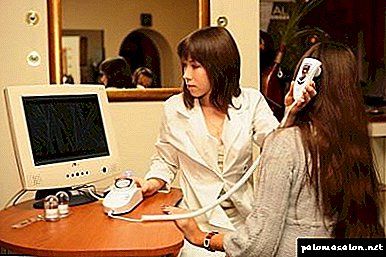
If signs of alopecia were found, it is necessary to seek help from the trichologist.
Initially, the doctor will begin a visual examination of the patient's skin. This will help to find out if he suffers from dermatological diseases. To determine the density of the hair connect phototrichogram, trichoscopy.
These innovative diagnostic methods help to identify the causes of alopecia and create a general clinical picture of a trichological disease. For examination, the parietal and occipital region of the head is studied.
Phototrichogram helps to make a reliable diagnosis. The principle of its implementation is that the patient is shaved a small area on the head. After 2-3 days, the trichologist proceeds to a detailed examination of this area. To do this, he tints the fluff that grew up in this place with a special dye and again uses the camera for inspection.
Such a diagnostic event helps to determine:
- type of baldness,
- the rate of hair loss and thinning
- the amount of hair in the resting and active growth phase,
- how intense is the fallout
- exact amount of hair per 1 cm of skin.
If you resort to this method regularly, you can learn about the effectiveness of therapy.
The list of tests for alopecia

So, what tests you need to pass with hair loss? To determine the causes of baldness prescribed:
- General blood analysis. It helps to find out whether there is inflammation in the body and to find out the level of hemoglobin, the lack of which often leads to the development of alopecia.
- Blood test for infection. This study will help identify or eliminate the pathological processes in the body.
- Biochemical analysis. He is able to detect the lack of minerals in the patient's body.
- Blood test for thyroid hormones (T4 and TSH). Baldness can develop amid an overabundance or lack of hormones.
- Mineralogram Spectral analysis is a necessary measure for the study of hair on the ratio of microelements in them. For its holding take a strand of hair 5 cm in length. Alopecia can often develop with a deficiency of such nutrients.
Additional research
To additional diagnostic measures to determine the causes of hair loss tests are assigned to determine the level of sex hormones.
If there is a suspicion that alopecia is caused by a hormonal imbalance, the trichologist may refer the patient to an endocrinologist. In this case, only one blood test is uninformative. To compile a more accurate picture of the disease, an ultrasound of the thyroid gland is performed. Treatment of failures of the hormonal system must be entrusted to a specialist. The task of the trichologist in this case is to draw up a treatment regimen aimed at strengthening the hair follicles.

Androgenic alopecia
Androgenic type baldness is most often hereditary. Under the influence of 5-alpha-edazy, which is located in the hair follicle, dihydrotestosterone is formed. The damaging effect of the latter depends on the strength of the follicles to combat negative effects. Alopecia can occur when the level of dihydrotestosterone rises, without changes in the hormonal background.
Alopecia develops in stages. At the early stage of the disease, the hair shaft becomes thinner to a fluffy state, after which the hair bulb atrophy and its replacement with connective tissue occurs.
Conclusion
Whatever the results of the study, you should not be sad. Today, medicine offers innovative methods of treating alopecia at all stages of its development. As soon as losses are detected, it is necessary to immediately turn to specialists to preserve the density of the hair. Any disease can be treated at the initial stage of development, therefore, tests for determining the cause of alopecia should be done as soon as possible.
Signs of hair loss
Hair loss - inevitable process. Each hair has its own life cycle, which includes 3 phases: growth, growth stop (cessation of cell division) and dormancy. At the end of the resting phase, the hair falls out when the formation of a new hair begins in the bulb, which pushes the old hair out.

Absolutely normal to lose up to 50-100 hairs per day, the main part of which falls out when combing, styling or washing the head. But how to understand that a fallout exceeds a predetermined rate and it is necessary to pass tests?
For this you need to conduct two simple tests:
- Look carefully at the fallen hair. If it ends in a small light seal (onion), then do not be alarmed because the hair fell in the stage of rest.
- Do not wash your hair for 2 days. After the end of this period, wrap the tail with your hands and pull the hair, put it on the clean sheet of paper. It should be repeated 3-4 times, affecting all parts of the head. Count the number of hairs on the sheet. If this number is greater than 15, then the loss exceeds the norm and It is worth thinking about passing the necessary tests.
Basic tests for intensive prolapse
There are several causes of loss, which can be found only after conducting research. It is important to pass all tests that find out the exact cause and find the right comprehensive treatment.
- Scalp biopsy
Biopsy is called the study of a small piece of tissue. The procedure involves prior excision of the tissue and taking a small sample of the skin, which is then examined under a microscope to determine abnormalities.
The results of the analysis are usually made within 2-4 weeks. Most often, a biopsy is prescribed to clarify the cause of baldness.
- Hormone testing
Changes in the hormonal background of the thyroid gland and the reproductive system can adversely affect the state of hair. It is necessary to pass an analysis on the content of thyroid hormones such as thyroxin, triiodothyronine, and thyrotropic. If they are rejected, severe hair loss, dryness and cross-section are possible. Do not forget about sex hormones: prolactin, progesterone and testosterone, DHEA-S, the level of which affects the condition of the skin and curls.
- General blood analysis
This type of analysis shows the amount of hemoglobin, red blood cells, leukocytes and platelets in the blood. With low hemoglobin anemia is possible, and an increase in the level of white blood cells indicates the occurrence of an inflammatory process in the body, which can lead to alopecia.

- Analysis of the level of serum iron in the blood
The iron element is responsible for the transport function of oxygen in the blood, and also participates in the metabolism.With its increased or decreased levels, the following diseases are possible: anemia, liver damage, an increase in the rate of red blood cell breakdown. Also, a reduced level of iron can say about the lack of vitamins B9 and B12 in the body, which directly affect hair growth.
- Spectral analysis of hair
The hair composition includes many micro and macronutrients. Minerals are actively involved in the formation of the follicle and its strengthening. With their lack of loss and may appear fragility, section. Spectral analysis helps to determine the level of microelements, and for it is enough a small strand.
Do not forget that each analysis provides its rules of conduct. Read them carefully to get a reliable and accurate result. After the readiness of all tests, a consultation of a trichologist is desirable, which can also refer you to an endocrinologist, a gynecologist or a general practitioner. Only after this it is advisable to draw up a clear plan for hair treatment.
5 mandatory tests for hair loss
For hair restoration, our readers successfully use Minoxidil. Seeing the popularity of this tool, we decided to offer it to your attention.
Read more here ...
When a person has a large amount of hair dramatically, when they become much thinner in six months, you should consult a doctor who will prescribe tests to identify the cause. In many cases, premature baldness can stop and even restore the lost scalpiness to the scalp. Hair loss tests are necessary to determine the optimal treatment program.
Hair loss must be investigated.
- Causes of Alopecia
- Survey
- Additional research
Causes of Alopecia
Baldness occurs for various reasons. Loss can occur due to external stimuli, when a person uses poor-quality hair dye, makeup, or be a signal of internal imbalance.
Causes of hair loss and thinning:
- Infectious, including fungal, diseases. This applies not only to skin lesions, but also to lesions of the internal organs that affect the immune system and lead to changes in the body.
- Violations of the hormonal background. If there is not enough female hormone in the body, estrogen, or a surplus of male, androgen, hair follicles experience hunger. They lose their power, “burn out”. Hormonal disorders occur as a result of diseases of the thyroid gland, ovaries or adrenal glands, frequent stress, prolonged medication, pregnancy.
- Vitamin and mineral deficiencies. To supply follicles, a set of micro and macro elements is needed. When they are absent in the diet, problems begin. Among the important minerals for hair growth are zinc, iron, selenium. No less necessary protein food.
Analyzes of hair loss in women are needed not only to cope with the problem, but also to detect or eliminate the presence of pathological processes in the body.
All tests for hair loss for women and men: the level of hormones is important
What needs to be tested for hair loss in the first place:
- General blood analysis. Shows the presence of inflammatory processes in the body. Determines the level of hemoglobin: anemia, when hemoglobin in the blood is not enough, can lead to hair loss.
- Blood test for infections. Needed to eliminate serious pathological problems in the body.
- Biochemical analysis. Will show if insufficient minerals are found in the blood. According to the results of the analysis, it is possible to determine the functions of which organs are impaired, what is missing in the diet.
- A blood test for thyroid hormone levels (T4 and TSH). An overabundance and lack of hormones in the blood can equally affect hair growth, nutrition of follicles.
- Analysis of iron content. Doctors determine the level of ferritin, transferrin, serum iron in the blood.
Causes of severe hair loss
A simple patient survey, which should answer the following questions to the doctor, is not excluded:
- how much the patient is resting
- how much time will be given to sleep
- which way of life, moving or sedentary, leads,
- Do you have any problems with your relatives?
- What is the diet, what foods consumes,
- What means does hair care use?
- under what conditions does it work
- whether a person uses medications, the time of admission.
If women lose their hair strongly, this is an alarming symptom, but not a sentence. The newest methods of treatment can restore the remaining hair to health, stop the balding process and return the weakened follicles energy for further growth.
What to do if hair falls out badly: folk remedies and drugs
An eerie sight is a comb, with which whole strands hang down with shreds. It becomes even worse when you start to notice that your luxurious curls are everywhere - on a pillow, in a bath, on a chair, in a car on a seat, on clothes. The once lush head of hair is thinning every day, and the only desire is to stop this process, to preserve the hair that is still present. The question that thousands of people who have hair fall out is completely understandable: what to do and what means to choose in order to stop this process. There are many methods, but the main thing is to understand and eliminate the cause that led to such a disastrous condition. Only in this case, a set of measures against hair loss, will work and stop further baldness.
 If you notice increased hair loss, the most appropriate solution is to visit the trichologist and follow his recommendations.
If you notice increased hair loss, the most appropriate solution is to visit the trichologist and follow his recommendations.
Health care
As soon as you notice that your hair is climbing, the most appropriate decision is to visit a trichologist, a specialist in diseases of the scalp and hair. He will be able to determine the exact cause of this phenomenon and prescribe the appropriate treatment. There are a number of drugs that effectively strengthen the hair follicles, preventing their loss.
First of all, these are vitamins that a doctor can prescribe as a part of a complex or in the form of individual capsules. If the situation is running, the doctor may prescribe intramuscular injection of vitamins in ampoules. A lot of vitamins work in different situations. Most often, those who begin to lose hair in bunches are prescribed:
- Vitamin A - strengthens the roots
- Vitamin B1 helps hair in stressful situations
- Vitamin B2 restores the roots
- Vitamin B3 and B6 activate metabolic processes,
- Vitamin B5 strengthens follicles,
- Vitamin B7 is considered the best cure for baldness,
- Vitamin B8 helps the roots absorb the remaining vitamins,
- Vitamin B9 and E renew cells,
- Vitamin B12 enriches roots with oxygen,
- Vitamin C improves immunity,
- Vitamin F makes curls very strong.
Vitamins are the basis of therapeutic therapy against hair loss.
"Minoxidil" - a vasodilator antihypertensive agent, which is often prescribed for alopecia (hair loss). It slows down and even stops hair loss, while stimulating the growth of new ones. However, you need to take it for quite a long time.
Fearlessly, you can use herbal medicines on a plant-based basis, since there are a lot of them: castor oil, burdock oil, dwarf palm extract and avocado oil. It is best to make them masks and compresses.
- Restorative procedures
The trichologist can be of invaluable assistance also by the fact that physiotherapy can be prescribed or head massage - procedures aimed at stimulating the growth of new hair and strengthening old ones.
I grew RUSSIAN spit! According to the village recipe! +60 cm in 3 months ...
It is recommended to use medications for hair loss only as prescribed by a physician, despite the fact that they are often sold in pharmacies without a prescription. For example, the same "Regein", the main active ingredient of which is the above described minoxidil. With improper dosage and unexplained causes of alopecia, medicinal drugs can only worsen the condition of the hair. Unfortunately, only 10% of the total population refers to specialists in this case according to statistics. The rest prefer folk remedies in the fight against hair loss.
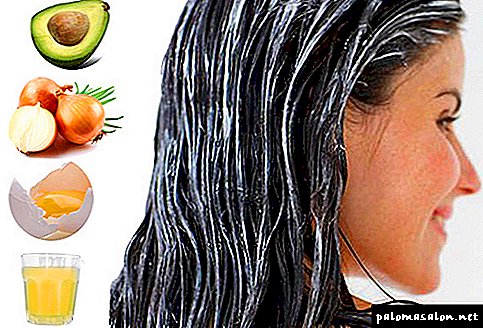 There are many quite affordable products that can help you strengthen and revitalize your hair, but if the reason lies inside, folk remedies may not work.
There are many quite affordable products that can help you strengthen and revitalize your hair, but if the reason lies inside, folk remedies may not work.
ethnoscience
The use of home remedies for hair loss can be as supportive therapy for the main course of treatment prescribed by a doctor, and can also be an independent solution to this problem. In any case, if you act without consulting the trichologist, be sure to check each of the products for allergies. Those who have whole hair stranding their hair can try out and evaluate different methods on their own experience: especially many of them are masks.
How to make a mask of brandy? A good cognac (1 tablespoon) rub with egg yolk and honey (dessert spoon). Apply to the roots of dirty, dry hair for 15–20 minutes. When rinsing add acetic acid or lemon juice (per liter of water a glass of product) to water. Do not use shampoo when washing off.
For any shampooing use for rinsing the hair is not plain water, and infusions of herbs such as sage, St. John's wort, burdock root, nettle or immortelle. All of them perfectly strengthen the roots and beneficially affect the condition of the hair.
Vegetable oil, honey heated in a water bath, onion juice (a tablespoon), rub with yolk. Rub into the scalp for 40 minutes. Hair at the same time should be slightly moisturized, but dirty. Wash off the mask with shampoo. To get rid of the onion smell, add a few drops of perfume or any essential oil to rinse.
You may have to try more than one tool before some result is achieved and the hair will no longer fall out in bunches. Several methods are combined at once, but only within reasonable limits. Too active attack on the hair follicles can produce the opposite effect. It often happens that both the medicines prescribed by the doctor and home remedies are used, but there is no result. Perhaps you just did not figure out why your hair falls out, and treat your disease in the wrong way. Many reasons lie in the wrong care and lifestyle.
 If your hair falls out, be sure to treat yourself to a healthy variety of diet - this is an important step towards eliminating alopecia.
If your hair falls out, be sure to treat yourself to a healthy variety of diet - this is an important step towards eliminating alopecia.
Hair falls out very much what to do? - Change your lifestyle!
Holding in your hands another fallen lock, think about what kind of lifestyle do you lead? After all, it directly affects the condition of your hair. Change it - and the hair will stop falling out.
Review your diet. It should be dominated by foods rich in vitamins for strengthening and growing hair. It:
- liver,
- meat,
- a fish,
- milk products,
- cereals,
- vegetables: carrots and cabbage, broccoli and tomatoes,
- spinach,
- dates,
- fruits: apricots, avocados and citrus,
- melon,
- nuts,
- the eggs.
What to do if hair began to fall out? Try to exclude from your menu fast foods, fatty and spicy foods, carbonated drinks and alcohol: perhaps it was the abundance of these products that provoked the disease.
Try to objectively assess the condition of your nervous system. Perhaps the constant stress, nervous breakdowns and depression have become the involuntary cause of alopecia. In this case, you need to drink antidepressants and try to be less nervous.
Hair for years can tolerate your nicotine addiction or passion for alcoholic beverages, but in one "beautiful" moment they will rebel and begin to fall out at a rapid pace. In this case, you should immediately abandon their pernicious and harmful habits for the sake of their own beauty.
- Changes in hormonal background
Try not to allow changes in your hormonal background, which can cause hair loss. To do this, you need to refrain from long-term use of birth control pills and in general any medications (especially antibiotics) and abortions.
Determining why this attack affected you, you can very quickly eliminate the root cause of hair loss and strengthen them. An important issue in this situation will be how well you take care of your damaged and falling hair.
 Your constant care of your hair is the best protection for them, and if you notice a deterioration in their condition, immediately analyze possible causes.
Your constant care of your hair is the best protection for them, and if you notice a deterioration in their condition, immediately analyze possible causes.
Hair care for hair loss
Competent hair care in the period of their loss - a guarantee of quick relief from alopecia. Given these simple rules in the future, you can prevent the future loss of their precious curls.
- Did your hair fall out? Comb your hair more often! It improves blood circulation in the scalp and nourishes the follicles, thereby strengthening the hair follicles. You can even purchase a special scalp massage brush to help restore and strengthen your hair.
- Do not get carried away with hairpins and tight elastic bands with hairpins: they tighten hair, disrupting their internal structure and damaging the roots.
- If you have done hair extensions, be prepared for the fact that after this alopecia, you can not escape. Maybe you should not do such a merciless and harmful procedure?
- If your hair starts to fall out, change the entire line of hair care products, even if you think it is perfect. Perhaps the whole thing in the wrong shampoo or balm. Cosmetic shampoos, balms and masks against hair loss are best bought at pharmacies.
- Do not brush your hair immediately after washing: let it dry first.
- Do not wash your head with too hot water: the optimum rinsing water temperature should not exceed 40 ° C.
- Dry your hair yourself, naturally: try not to use hair dryers, irons, curling irons.
It is much easier to prevent the process of hair loss than to remove it later. Therefore, competent hair care and a healthy lifestyle - the best preventive measures in this matter. If you could not save your hair from such an adversity, promptly begin a comprehensive treatment, finding out why the curls remain everywhere, no matter where you appear. Drugs, coupled with folk remedies to help cope with the loss. Only the correct approach to this process will keep the curls radiant, strong and healthy. And all this must be done in a timely manner.
For hair restoration, our readers successfully use Minoxidil. Seeing the popularity of this tool, we decided to offer it to your attention.
Read more here ...
What needs to be tested if hair falls out?
Thick, well-groomed hair is considered a decoration of a person, they are able to emphasize the natural beauty and make the appearance more attractive. The topic of hair loss is relevant not only for women, but for men.

Doctors claim that daily natural hair loss is 80 hairs. Otherwise, you need to consult a doctor to maintain density. The physician must perform an examination and prescribe therapy.
Diagnostics
Before going to the doctor, it is recommended to do a test analysis at home to eliminate the possibility of self-hypnosis.The manipulation is simple: take a small strand into a fist and with a little effort comb it with your fingers. Normally, no more than seven hairs will fall out.
High-quality diagnostics should consist of several main stages. At the first stage, the patient is recorded for consultation with the trichologist. At the reception, the doctor interviews the patient to clarify the characteristics of the pathology: when the hair falls out, how intense, whether there is a genetic predisposition.

The doctor is interested in the patient's lifestyle: specifies whether serious illnesses and stresses have been transferred, reproduces the usual diet. Information will help determine the type of alopecia and its current stage, as well as the trichologist will be able to draw up a program for the care of hair.
Computer diagnostics
The second stage of diagnosis begins with the examination of the patient, after which the doctor receives a characteristic of the pathology: its type, location zone, stage of development and cause. The trichologist pays attention to the integument to exclude the progression of diseases and to make a visual description of the hairs.
Using trichoscopy specialist determines the density of the hair. This modern method is much simplified task in determining the causes of baldness. To do this, examine the parietal zone and the occiput.

The phototrichogram method consists of the following manipulation: the patient is shaved with a small strand, which the doctor analyzes further. The doctor adds data to the case history:
- The determination of the number of active and passive hairs.
- Type of disease.
- Approximate prediction of the outcome of therapy.
In the third stage of treatment, the trichologist prescribes tests to confirm the preliminary diagnosis. The analyzes are divided into two groups: mandatory to pass, which take place individually.
Blood test
Any examination, regardless of the disease begins with a blood test. After receiving the results, the laboratory assistant determines the amount of hemoglobin in the body. The standard figure is 130 grams per liter, deviations of 15 grams per liter are allowed.

Particular attention is due to the fact that its lack of can cause iron deficiency anemia - a characteristic disease of the female body. Excessive value indicates internal inflammation of the organs responsible for reproductive function.
Biochemistry Analysis
In the process of diagnosis, the laboratory assistant studies the composition of the blood, its quantitative indicators. This is due to the fact that iron, magnesium and calcium affect the structure of the hair. The analysis will display the current state of vital organs - the liver and kidneys. Problems with these organs play a crucial role in the development of a toxic type of alopecia.
Deviation from the standard can be compensated by proper nutrition and dietary supplements, the main component is iron.
Thyroid analysis
The goal of the endocrinologist is to study three hormones: thyrotropic, thyroxine and triiodothyronine. To take this type of analysis is necessary not only if there are problems with baldness, but also systematically, since the state of the thyroid affects the general condition of the person.
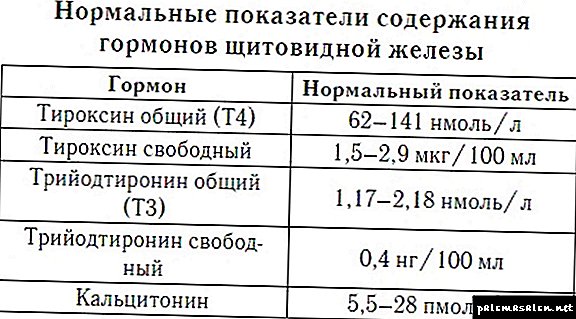
Exceeding the norm entails a progressive loss, and the indicator less than the norm becomes the result of weakening the hair - loss of natural luster, loss of integrity, dullness. For a detailed picture, the endocrinologist will write out a referral for an ultrasound scan, which will determine the violation factors.
Women should go for a test a week after the last menstrual period. At the final stage, the endocrinologist makes a comprehensive assessment of the results and diagnoses androgenetic alopecia.
Analysis of sex hormones
The female organism requires attention to itself, since many active processes occur in it every day, one of which is the production of hormones.
Violations of their quantitative characteristics occur when the pituitary gland malfunctions, on which testosterone depends. A slight deviation can activate baldness or, on the contrary, hair distribution.
Trichogram
This method refers to the microscopic study of the strand and skin. Trichogram includes two aspects:
- For diagnosis, 60 patient's hairs are provided, which are examined to determine their phase. Usually 9/10 of his hair is on the active stage. If the trichogramma diagnosed that more than 10% of the hairs are inactive, telogen alopecia is diagnosed, it can be confirmed by the result of the analysis of germ cells.
- The formation of bald patches changes the approach to the procedure: it is necessary to inspect the alopecia zone. The focal type of the disease characterizes the impaired immune system, and the cicatricial type is the result of injury or infection.

Preventive actions
In addition to medical therapy, the person himself can improve the condition and appearance of the hair, guided by simple rules. It should increase the amount of natural products and vitamins in the diet. Harmful foods, bad habits and coffee drinks have a negative effect on human hair.
Before the use of antibiotics, hormonal drugs and contraceptives, it is imperative to contact a therapist. Weather conditions have a significant impact: in cold winters and hot summers it is advised to wear hats.
Minor secrets for hair care, the observance of which has a positive effect:
- wet hair should be wet and wrapped in a soft towel,
- drop hair dryer and other appliances
- limit your feelings and stress by replacing them with green herbal tea.
2 Physician therapist

For any complaints, first of all we always go to our therapist. This doctor has the most extensive knowledge in different areas and will be able to advise who to turn to or what tests for hair loss to pass first. The therapist most likely will advise you to contact a more specialized doctor, the trichologist.
4 Complete blood count

Mandatory analysis, which is prescribed by any doctor, is a complete blood count, it indicates the content of hemoglobin in it. This analysis will be most revealing for women, because they have a predisposition to low levels of hemoglobin in the blood (anemia).
The reason for low hemoglobin levels in women may be pregnancy. During this period of life, two organisms as one unit equally require healthy nutrition, vitamins and care. Therefore, hair loss can be completely normal.
6 Analysis for infections
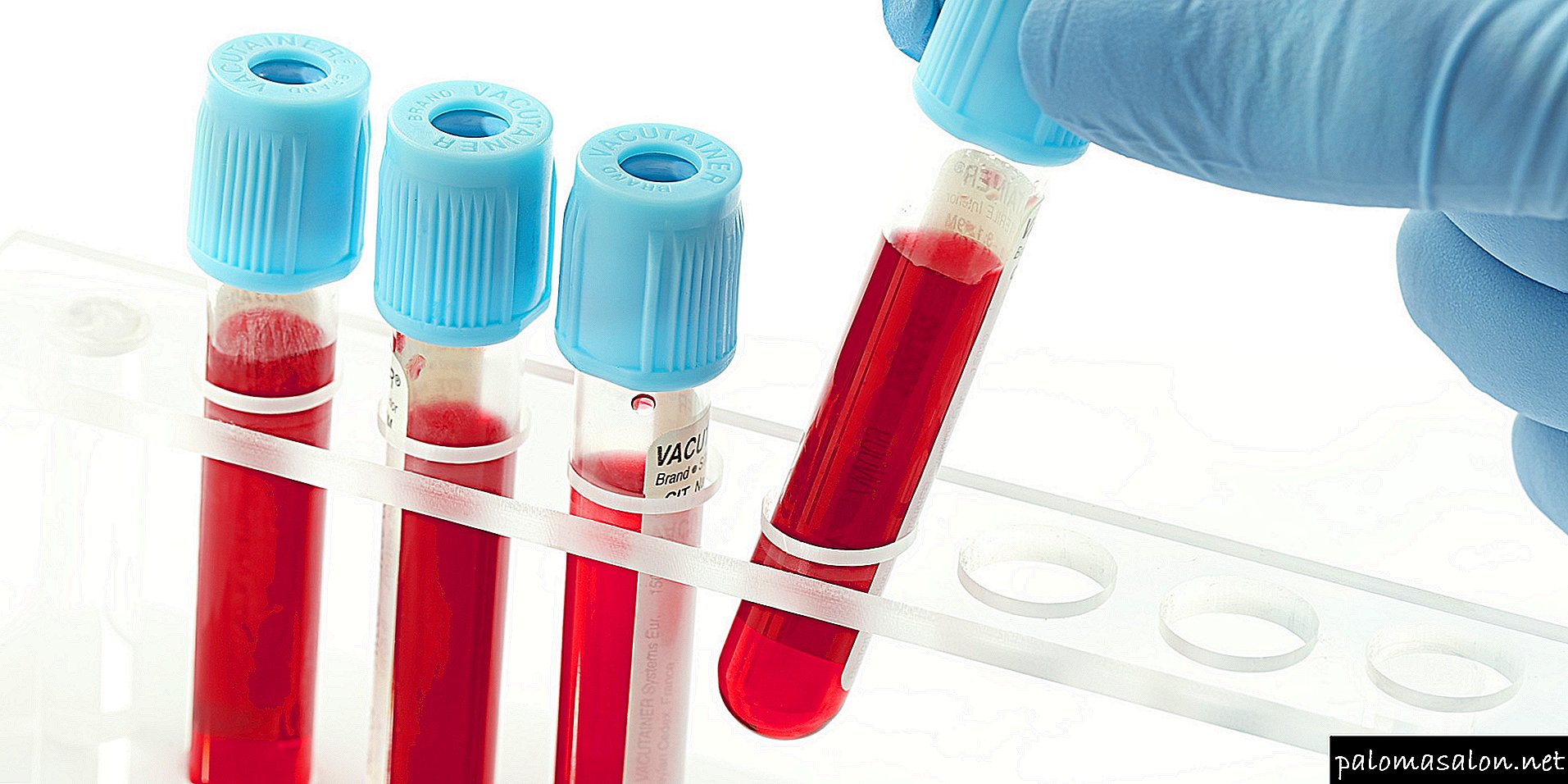
A blood test for the presence of infections may indicate the level of development of alopecia or its absence. The presence in the body of foreign organisms - worms, can adversely affect hair growth and be the cause of their loss.
When you contact the trichologist, you will receive a referral to submit these three analyzes. If the results are positive, the trichologist will advise you to contact other doctors. They will give you new tests and treatments.
7 Analysis for hormones
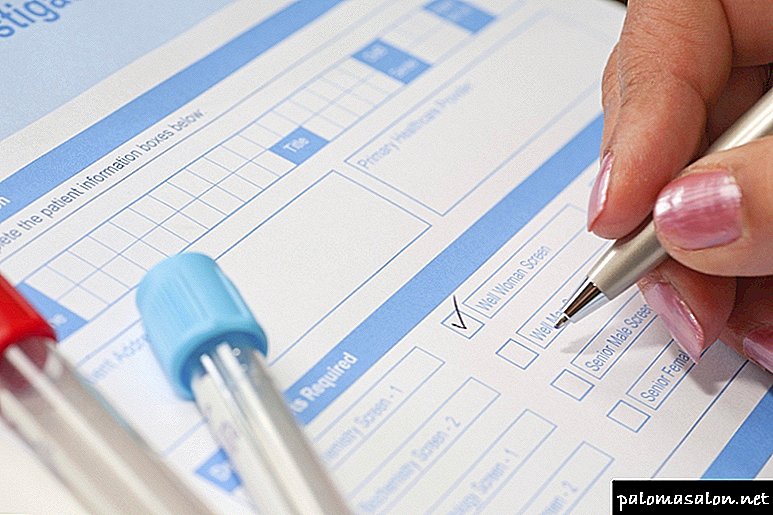
Frequent causes of hair loss are hormonal disruptions. When you take certain tests, you can determine the hormones that may be disturbed. Hormonal failure can lead to alopecia (alopecia), menstrual disorders, acne.
Another reason for baldness in the same extent as in women and men is the hormone testosterone. This hormone in the female body is called dihydrotestosterone. To determine the level of this hormone can be by blood analysis, but even a slight detection can affect the body.
8 Spectral analysis of the hair structure

Spectral analysis of hair involves the study of the content of various trace elements in the human body, in the hair. As specialists have found out, every hair of our body is able to tell about the excess or deficiency of trace elements throughout our body.
Spectrum analysis is paramount for the trichologist. Spectral analysis can reveal the nature of food, bad habits, the degree of functioning of the kidneys and liver, allowing you to prevent or cure chronic diseases.
9 Doctor endocrinologist

A consultation with an endocrinologist will help you get tested for the presence of hormones such as thyrotropic thyroxin and triiodothyronine, which are responsible for the functioning of the thyroid gland.
A visit to the endocrinologist is a mandatory measure, since further treatment and investigation of the problem depends on the test results. The endocrinologist can also prescribe tests for the hormone prolactin, the excess of which can cause the process of hair loss.
Hormonal background can be elevated due to an enlarged thyroid gland. If the content of hormones: thyrotropic thyroxin and triiodothyronine exceeds the permissible norms, then there is abundant hair loss. With a reduced content - dryness and severe pinching of the tips is observed.
10 Doctor gastroenterologist

Your gastroenterologist will give you a test for hair loss, such as an abdominal ultrasound scan, a test for dysbacteriosis or the presence of foreign microorganisms (worms). The importance of detecting these diseases in the early stages is a very important event, since all independent methods of treatment can be completely in vain.
If your body suffers from increased acidity of the stomach or dysbacteriosis, then used vitamins, trace elements are simply not absorbed. The same problem will be with the presence of worms, since these parasites will take away all the beneficial substances.
11 Gynecologist
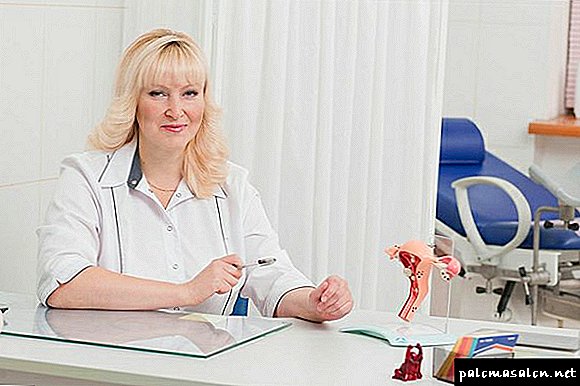
The pledge of women's health is a regular examination by a gynecologist. Studies are required in case of failure in the menstrual cycles or any other complaints that may be caused by changes in hormonal levels.
There is also a hormone progesterone, a decrease in the rate of which can be not only the cause of hair loss in women, but also aggravate the condition of the organs and the organism as a whole. The gynecologist analyzes the sex hormones, the disruption of which can cause an imbalance in the body or various inflammatory processes.
12 Neurologist
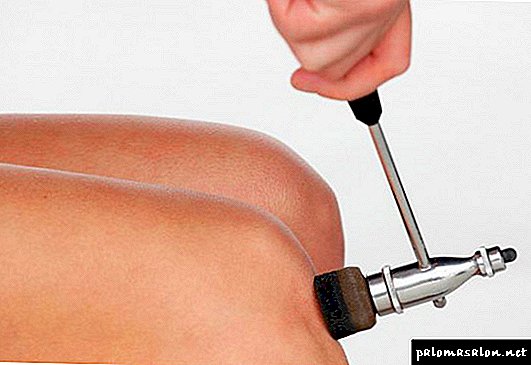
When hair loss requires research and consultation of a neurologist. After all, the cause of this problem may be poor circulation of the scalp. This may be due to the sedentary monotonous work, because during the day our neck and head performs little movements, which reduces the power of the hair follicles. The recommendations of a neurologist can be a head massage or a five-minute exercise during the working day.



